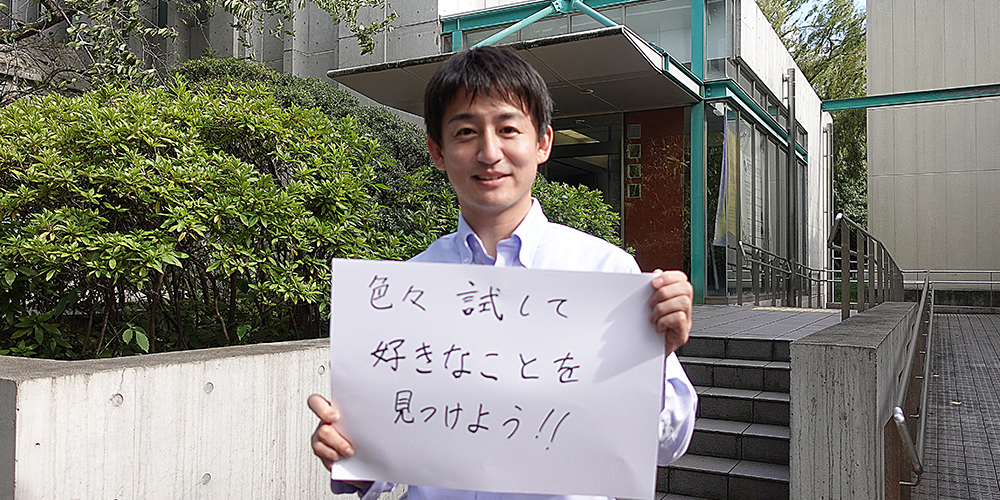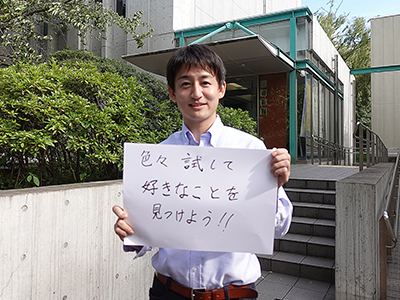People who convey voices from the sea
People who convey voices from the sea

Once you start doing it, you become absorbed in it until it goes well.Research is like sports
Faculty of Marine Life Science Department of Food Production Science Seiya Tanaka Assistant Professor
Until it goes well once you start
I'm enthusiastic.
Research is like sports
Faculty of Marine Life Science Department of Food Production Science Seiya Tanaka Assistant Professor

Biography
Seiya Tanaka(Seiya Tanaka)
Academic Assembly Department of Food Production Science Assistant Professor
- Q What department do you belong to?
↓
- Department of Food Science and Technology
- Q What kind of classes do you teach?
↓
- Undergraduate 1st to 3rd year student experiments such as introductory experiments in food production science, food chemistry experiments, and basic food chemistry experiments
- Q What kind of research are you doing?What do you find interesting about that research?
↓
- We are studying the absorption, metabolism, and physiological effects of EPA and DHA, which are abundant in fish oil.The body recognizes subtle differences in chemical structure to distinguish between absorption and metabolism depending on its intended use.I find it very rewarding when I successfully synthesize my own lipids by organic synthesis, when I discover new analysis methods, and when I discover previously unknown physiological effects.Conversely, even when things don't go well, I enjoy thinking about various things with my students.
- Q What inspired you to do this research?Please tell us about the episodes that you fell in love with, the episodes that lead to your current research, etc.
↓
- I've always liked food, and I like shopping at supermarkets.I wanted to study food at university, so I joined a food research lab.
When I was a university student, I used rats to investigate the absorption of polyphenols, and I conducted animal tests to measure polyphenol concentrations in the blood.I feel a sense of accomplishment when I succeed in a difficult animal test, when I develop a new analytical method, and when I establish better conditions as a result of various investigations.
Since I was fascinated by experiments and research when I was in graduate school, I came to think that I would like to do a job that allows me to conduct experiments and research in the future.I was particularly interested in analytical instruments, so I focused on developing analytical methods.
Once I start doing something, I become absorbed in it until it goes well, so I feel that research has some similarities to sports, and is part of my job as well as part of my hobby.


- Q What number of SDGs is your research related to?How will your research help society?Also, what kind of occupation or work do you think it will lead to?
↓
- No. 9 (Let's build a foundation for industry and technological innovation), No. 3 (Health and well-being for all) This will lead to the development of unprecedented foods that are not fattening and foods that are less greasy.We are also developing analysis methods for lipids, and can provide useful information to food companies, pharmaceutical companies, and analysis companies.
- Q What are your future goals as a researcher?What kind of "dream" do you want to give to the world through your research?It doesn't have to be realistic.Please tell me your dream of becoming a teacher.
↓
- My future goal is to become a leading Japanese researcher in the analysis and functionality of phospholipids.I would like to participate in international conferences and promote Japan's technological and research capabilities.
In recent years, the functionality of food has been attracting attention. We believe that we have discovered new knowledge that can prevent disease in
There is a possibility that marine resources are not yet known, so I would like to contribute to the fishery industry by maximizing the functionality and effectiveness of marine resources. - Q: Looking ahead to 2030, what kind of research would you like to do with incoming students?
↓
- I would like the students who do research with me to learn about the “fun” of research and use it in their future work.Research involves a lot of simple work, but I would like to do a lot of research on my own and do some trial and error so that the students can discover new knowledge on their own.






